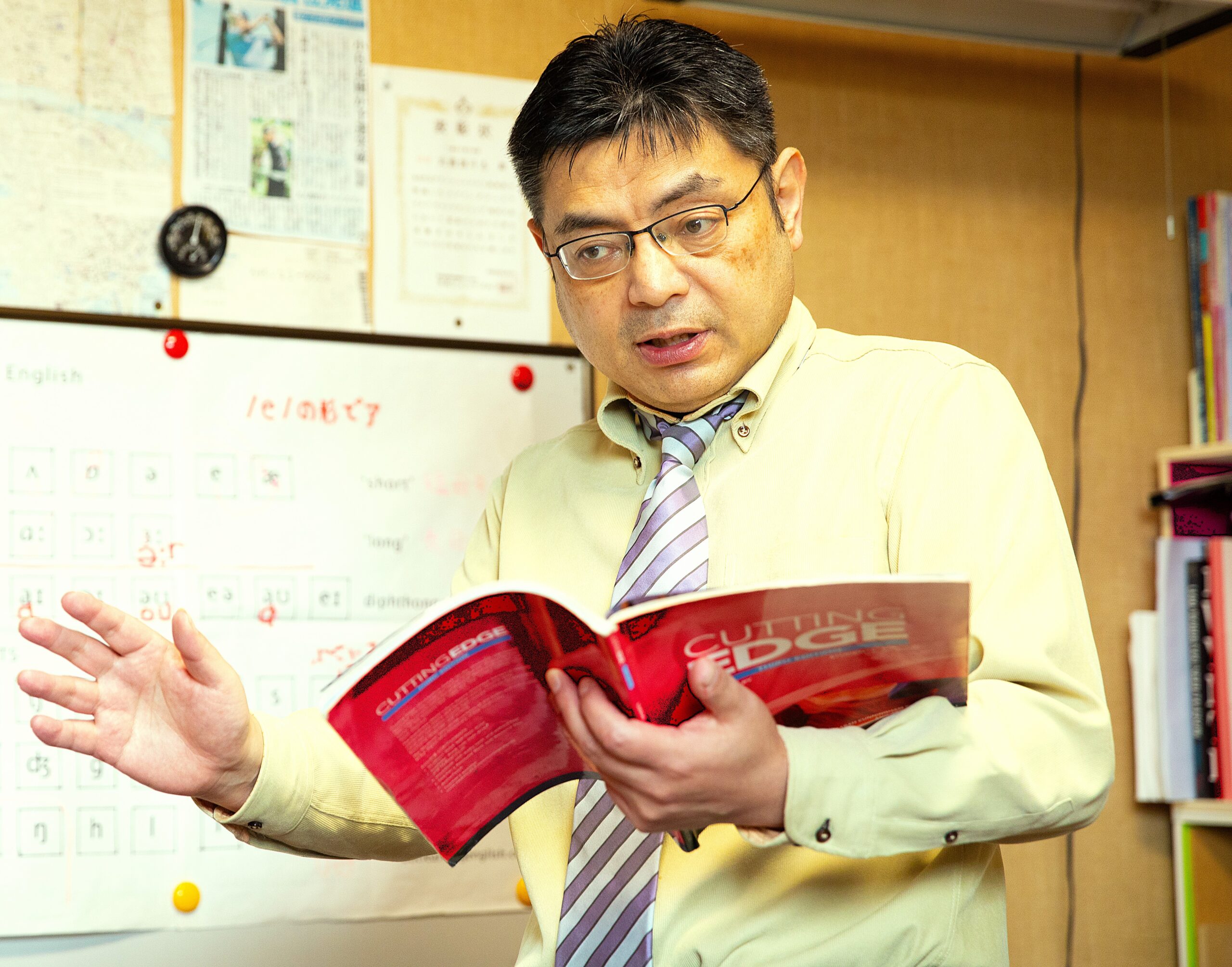序文:今こそ読み返すべき英語の提言
インバウンドがますます増加し、観光客だけでなく、日本語を学びに来る外国人も年々増えている今。金沢で英語コンサルタントを務める私が、30年以上前に英字新聞に寄稿した手紙は、現在にも通じるメッセージを含んでいます。
当時はまだ珍しかった外国人留学生の受け入れ。しかしその過程で感じたのは、ホストファミリーとしての私たちの誤解と、語学に対する思い込みでした。このレターは、私が英語で日本文化の本質を伝えようとした初めての「パブリックな挑戦」でもあり、英会話エスティームの理念の原点でもあります。
当時はまだ珍しかった外国人留学生の受け入れ。しかしその過程で感じたのは、ホストファミリーとしての私たちの誤解と、語学に対する思い込みでした。このレターは、私が英語で日本文化の本質を伝えようとした初めての「パブリックな挑戦」でもあり、英会話エスティームの理念の原点でもあります。
本文(英語原文)
Speak Nihongo
In Kanazawa, there has been a dramatic increase over the past couple of years in the number of foreign students studying Japanese.
This dramatic influx of foreign students has caused a shortage of host families, which forces some students to turn to cheap accommodation instead and inevitably undermines the most important and effective part of their stay, namely, an opportunity to learn about our culture through being with a family. This stems, I think, partly from the fact that people in Kanazawa (maybe throughout Japan) misunderstand what role a host family ought to play in accepting a student.
Is it really imperative for a host family to have a good command of English, as the majority of us tend to think? Though we tend to regard English as the only means of international communication, it is time for us to realize this is not necessarily true and may even disappoint some serious students who have spent a considerable amount of money coming here to master Japanese.
Would you be happy staying with a family overseas who spoke Japanese all the time if your goal was to learn English? Naturally you would not, because you would want to speak English. The same is true for a student studying Japanese.
We should, therefore, bear in mind what individuals visiting Japan need. They might be a tourist, English teacher, businessperson, student or a permanent resident - there is a wide spectrum of foreigners in Japan nowadays. I suggest that we use Japanese in the first instance and see how a person reacts, and then choose whatever language seems appropriate for the situation.
As our precious language is being shared more and more by non-Japanese, it is our individual obligation to help them learn it just as we wish to speak English fluently. It is just a matter of tolerance in letting them try to speak Japanese. Don’t take the mickey out of their mistake or funny sentences. Speak slowly and clearly. This is exactly what we seek from native speakers of English when we go abroad.
If more people in Japan started considering what students really need, there would surely be no shortage of host families, and Japan could offer much more in promoting cultural understanding at the grassroots level.
In Kanazawa, there has been a dramatic increase over the past couple of years in the number of foreign students studying Japanese.
This dramatic influx of foreign students has caused a shortage of host families, which forces some students to turn to cheap accommodation instead and inevitably undermines the most important and effective part of their stay, namely, an opportunity to learn about our culture through being with a family. This stems, I think, partly from the fact that people in Kanazawa (maybe throughout Japan) misunderstand what role a host family ought to play in accepting a student.
Is it really imperative for a host family to have a good command of English, as the majority of us tend to think? Though we tend to regard English as the only means of international communication, it is time for us to realize this is not necessarily true and may even disappoint some serious students who have spent a considerable amount of money coming here to master Japanese.
Would you be happy staying with a family overseas who spoke Japanese all the time if your goal was to learn English? Naturally you would not, because you would want to speak English. The same is true for a student studying Japanese.
We should, therefore, bear in mind what individuals visiting Japan need. They might be a tourist, English teacher, businessperson, student or a permanent resident - there is a wide spectrum of foreigners in Japan nowadays. I suggest that we use Japanese in the first instance and see how a person reacts, and then choose whatever language seems appropriate for the situation.
As our precious language is being shared more and more by non-Japanese, it is our individual obligation to help them learn it just as we wish to speak English fluently. It is just a matter of tolerance in letting them try to speak Japanese. Don’t take the mickey out of their mistake or funny sentences. Speak slowly and clearly. This is exactly what we seek from native speakers of English when we go abroad.
If more people in Japan started considering what students really need, there would surely be no shortage of host families, and Japan could offer much more in promoting cultural understanding at the grassroots level.
👉 オリジナルの英字新聞掲載レターはこちらからご覧いただけます:
PDFを開く
日本語訳
日本語を話そう
金沢では、ここ数年で日本語を学ぶ外国人留学生の数が劇的に増加しています。
この急増によってホストファミリーが不足し、一部の学生は安価な宿泊施設を利用せざるを得なくなっています。結果として、家庭での生活を通じて日本文化を学ぶという、滞在の最も大切で効果的な部分が損なわれているのです。これは、金沢だけでなく日本全体で「ホストファミリーの本来の役割」に対する誤解があるからだと私は思います。
本当に、ホストファミリーには英語力が必要なのでしょうか?多くの人がそう考えがちですが、英語だけが国際コミュニケーションの手段だと思い込むのは間違いです。それどころか、せっかく日本語を学ぶために多額の費用をかけて来日した真剣な学生たちをがっかりさせてしまうかもしれません。
英語を学ぶために外国に滞在しているのに、ホストファミリーが常に日本語しか話さなかったらどう感じますか?きっと満足できないでしょう。同じことが日本語を学ぶ学生にも当てはまります。
だからこそ、私たちは日本を訪れる人々の立場や目的をよく考えるべきです。観光客、英語教師、ビジネスパーソン、学生、永住者——今や日本にはさまざまな外国人がいます。まずは日本語で話しかけて相手の反応を見て、その場に適した言語を選ぶようにしてみてはいかがでしょうか。
今や、私たちの大切な言語である日本語も、外国人と共有される時代です。私たちが英語を流暢に話したいと願うように、彼らにも日本語を学んでほしいと思うなら、寛容な気持ちで挑戦を応援すべきです。彼らの間違いや面白い表現を笑ったりせず、ゆっくり、はっきりと話しましょう。これは私たちが海外で英語を学ぶときに、ネイティブスピーカーに望むこととまったく同じです。
日本人がもっと学生の本当のニーズを理解しようとすれば、ホストファミリーの不足問題は自然と解消され、草の根レベルでの文化理解もきっと深まるはずです。
金沢では、ここ数年で日本語を学ぶ外国人留学生の数が劇的に増加しています。
この急増によってホストファミリーが不足し、一部の学生は安価な宿泊施設を利用せざるを得なくなっています。結果として、家庭での生活を通じて日本文化を学ぶという、滞在の最も大切で効果的な部分が損なわれているのです。これは、金沢だけでなく日本全体で「ホストファミリーの本来の役割」に対する誤解があるからだと私は思います。
本当に、ホストファミリーには英語力が必要なのでしょうか?多くの人がそう考えがちですが、英語だけが国際コミュニケーションの手段だと思い込むのは間違いです。それどころか、せっかく日本語を学ぶために多額の費用をかけて来日した真剣な学生たちをがっかりさせてしまうかもしれません。
英語を学ぶために外国に滞在しているのに、ホストファミリーが常に日本語しか話さなかったらどう感じますか?きっと満足できないでしょう。同じことが日本語を学ぶ学生にも当てはまります。
だからこそ、私たちは日本を訪れる人々の立場や目的をよく考えるべきです。観光客、英語教師、ビジネスパーソン、学生、永住者——今や日本にはさまざまな外国人がいます。まずは日本語で話しかけて相手の反応を見て、その場に適した言語を選ぶようにしてみてはいかがでしょうか。
今や、私たちの大切な言語である日本語も、外国人と共有される時代です。私たちが英語を流暢に話したいと願うように、彼らにも日本語を学んでほしいと思うなら、寛容な気持ちで挑戦を応援すべきです。彼らの間違いや面白い表現を笑ったりせず、ゆっくり、はっきりと話しましょう。これは私たちが海外で英語を学ぶときに、ネイティブスピーカーに望むこととまったく同じです。
日本人がもっと学生の本当のニーズを理解しようとすれば、ホストファミリーの不足問題は自然と解消され、草の根レベルでの文化理解もきっと深まるはずです。
まとめ:日本語と英語は“与える”ための道具
この手紙を書いた1993年も、今の2025年も、「言語を通じた文化理解」は変わらぬ課題です。英語が話せることは確かに価値がありますが、それ以上に大切なのは、相手の言語や文化を尊重する姿勢です。
英会話エスティームでは、英語を学ぶ日本人が「伝える力」を身につけられるよう、一人ひとりに最適なプライベートコーチングを提供しています。30年前の私の思いは、今も指導の中心にあります。
当校受講生の体験記→
無料体験を申し込む
ホームに戻る
英会話エスティームでは、英語を学ぶ日本人が「伝える力」を身につけられるよう、一人ひとりに最適なプライベートコーチングを提供しています。30年前の私の思いは、今も指導の中心にあります。
当校受講生の体験記→
無料体験を申し込む
ホームに戻る

